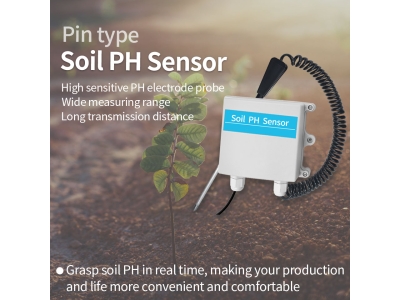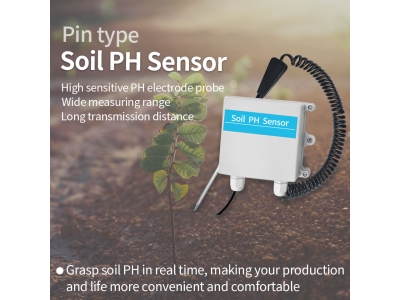Precision agriculture has revolutionized farming practices by leveraging modern technologies to optimize crop production and minimize resource wastage. One such technology that is gaining momentum in the agricultural industry is the use of soil sensors. Soil sensors provide real-time data on key soil parameters, enabling farmers to make data-driven decisions about irrigation, fertilizer application, and other essential farming practices. In this article, we will delve into the power of soil sensors in precision agriculture and explore their numerous benefits.
Understanding Soil Sensors: Soil sensors are electronic devices designed to measure various soil parameters accurately. These include soil moisture, temperature, pH levels, and nutrient content. By continuously monitoring these parameters, farmers can gain valuable insights into the condition of their soil, allowing them to optimize crop growth and resource management.
Typically, a soil sensor consists of a probe with embedded sensors and a transmitter. The probe is inserted into the ground, where it collects data on the soil parameters. The transmitter then sends this data wirelessly to a central system or a mobile device for analysis and interpretation.
Optimizing Irrigation Practices: Water is a precious resource, and efficient water management is crucial for sustainable agriculture. Soil sensors play a vital role in optimizing irrigation practices by providing accurate real-time data on soil moisture levels. This information allows farmers to understand when and how much water their crops require, ensuring that irrigation is precisely tailored to their needs.
Over-irrigation not only wastes water but also leads to nutrient leaching and potential crop diseases. On the other hand, under-irrigation can stunt crop growth and reduce yields. Soil sensors eliminate such inefficiencies by providing farmers with precise information, enabling them to apply water resources judiciously.

Balancing Soil Nutrients: Proper nutrient management is essential for optimal crop growth and productivity. Soil sensors assist farmers in achieving this balance by measuring nutrient content in the soil. By monitoring nutrients like nitrogen, phosphorus, and potassium, farmers can tailor fertilizer application to meet the specific needs of their crops.
Over-fertilization can lead to environmental pollution as excess nutrients run off into water bodies. It can also incur unnecessary expenses for farmers. Conversely, under-fertilization can result in nutrient deficiencies that hamper crop health and yield. With soil sensors, farmers can accurately assess nutrient levels and adjust fertilization plans accordingly, minimizing waste and maximizing yields.
Monitoring Soil pH: Soil pH directly affects nutrient availability and microbial activity in the soil. Different crops have different pH requirements for optimal growth. Soil sensors provide farmers with real-time data on soil pH levels, enabling them to monitor and manage soil acidity or alkalinity efficiently.
By ensuring that the soil pH is within the appropriate range for a specific crop, farmers can enhance nutrient uptake and promote healthy root development. It also helps prevent nutrient lock-up or toxicity issues that can hinder crop growth or damage plants. Soil sensors empower farmers to take timely corrective measures, such as applying lime or acidifying agents, to maintain ideal pH conditions for their crops.
Enhancing Decision-Making and Efficiency: The wealth of data generated by soil sensors empowers farmers to make informed decisions promptly. By leveraging this information, farmers can optimize resource allocation, implement effective pest management strategies, and plan planting schedules more efficiently.
Integration of soil sensor data with other precision agriculture technologies, such as satellite imagery and weather forecasts, further enhances decision-making capabilities. Farmers gain comprehensive insights into their fields' conditions, enabling them to proactively address challenges and maximize productivity.
Environmental Sustainability: Precision agriculture aims to minimize environmental impacts while maximizing agricultural productivity. Soil sensors contribute significantly to this objective by reducing resource wastage and preventing pollution. With precise monitoring of soil moisture and nutrient levels, farmers can use water and fertilizers more efficiently, minimizing runoff and leaching.
By adopting sustainable practices guided by soil sensor data, farmers can maintain soil health, reduce the need for chemical inputs, and promote overall environmental sustainability. This not only benefits the farming community but also helps preserve natural resources for future generations.
Future Trends and Challenges: As soil sensor technology advances, new trends and challenges are emerging. The miniaturization of sensors, accompanied by lower costs, is making them more accessible to farmers of all






